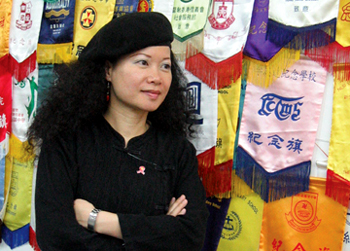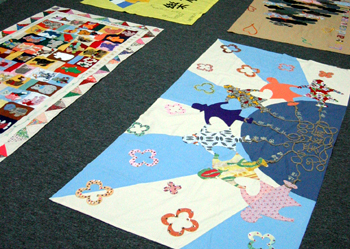People
Other Stories

Atty Ching Tsui-wan dedicates 11 years to promoting sex education and AIDS prevention. Hilda Fong
Sex educator leads youth fight against AIDS
by Hilda Fong
Atty Ching Tsui-wan has a strong conviction that sex education for young people is indispensable for the prevention of AIDS. For the past 11 years, the founder and director of Teen AIDS has b een championing the cause through different channels including schools, churches, lectures and the media.
Her education centre is the only non-governmental organisation in Hong Kong that specialises in helping teenagers know about sex and health as well as how to prevent from being infected with HIV, through games, art and other interactive means.
Now also a host of the Radio Television Hong Kong's radio show “Sexy Line” and the author of several books about sex and AIDS, Ms Ching, however, embarked on her mission because of guilt and a promise.
In 1995, when Ms Ching was a teacher, she worked as a volunteer in a group set up by her Australian neighbour and several foreigners to concern about AIDS education for the youth in the territory.
A few months later her neighbour planned to leave the city and asked Ms Ching to continue with the work. But Ms Ching declined. “(At the time) I didn't know what AIDS was and I thought it was none of my business. I just took part in the group for fun,” she said.
Her neighbour had a miscarriage at the end of that year because of the heavy workload at the volunteer group, and Ms Ching was overwhelmed by shame.
“As a Chinese, I was extremely ashamed. Though she was only a foreigner, she was so concerned about Chinese youths in Hong Kong .” She then promised her friend to take up the group, which was then transformed into Teen AIDS.
“I had no helpers, no money, no office space, no resources and no experience. I just started all on my own,” the 45-year-old activist said.
“When I knocked on doors of principals, no one bothered to respond to me,” she said.
“The schools all claimed that they were good enough and they did not need sex education. Or, they claimed that they had good students and thus did not need to know anything about AIDS.”
Ms Ching did not give up. Instead, her past experience as a teacher and keen interest in plays helped her develop a unique way of promoting sex education and AIDS prevention.
For months and years, she has kept organising a lot of activities, which make use of a systematic teaching method that combines games and art together to impress young people.
“I strongly believe that if you want teenagers to listen to you, you must keep them awake,” Ms Ching said. Learning through games is interesting and interactive enough to hold teenagers' attention.
“Art is the fastest way to impress others,” she said. Her group's activities include different forms of art such as dramas, dance shows, band music performances, display of posters, design of wishing cards as well as literature.
The AIDS Memorial Quilt Project is one of the Teen AIDS art schemes in which volunteers make quilts to remember each child died of the disease.
Through Ms Ching's effort, AIDS and sex education was gradually introduced to the public.
“Both the government and the public at the time believed that sex education and AIDS prevention were separate issues,” she said.
But the activist stood firm, as she was certain that if health education was well promoted, the proportion of young people being infected with the AIDS virus would be lowered.
AIDS prevention should start with sex education as unsafe sex may lead to infection with the disease, said Ms Ching, who is also a sex therapist and family counsellor. Now, Ms Ching finds sex education in Hong Kong is gradually improving, and schools, churches and parents are becoming more active in the matter.
“It's different now. These few years, we have been invited to give talks,” Ms Ching said, though some schools still asked her not to mention words like “sex” or “make love” during her talks to students.
Ms Ching's hard work earned her the Outstanding AIDS Workers award in 1998.
Despite her continuous effort, the road to success is still long. Ms Ching said young people were always curious about sex and their attitudes were greatly affected by the media.
The Internet, comics, computer games, pop songs and advertisements all contain elements of sex and they are in teenagers' reach, she said.
She is upset about the impact of the obscene culture in the media on young people.
“The relationships between two sexes are heavily distorted by the media. All men are considered as monstrous, and it is expected that all women are making use of their bodies in exchange for money,” Ms Ching said.
Still, she is resolved to help young people out. “As a youth and sex education worker, I can clearly see how the media is affecting young people.” And that makes her more determined to do her job better.
But the help of the government is crucial, she said. “I really hope that there can be compulsory sex education in schools in Hong Kong .”
To her disappointment, the government though once set down a curriculum for sex education in primary and secondary schools, it has never been implemented.
“They (the government) have no materials, no people,” she said. “I wish one day, primary and secondary schools in Hong Kong can have systematic sex education concretely pushed forward.”
To help the development of sex education and to prepare for future needs, Ms Ching runs programmes to train people like teachers to educate the youth on sex and education. She also aims that she can compile all raw data about cases of AIDS patients in Hong Kong , which she has long collected, into casebooks or even teaching materials.
After all, Ms Ching sees the most valuable reward of her work is that she can share the experience and feelings of the patients and the other people in distress.
“Sex is very personal and private,” she said, noting that it sometimes brought pain and tears to one's life.
Ms Ching is impressed and touched. Her work means more.
